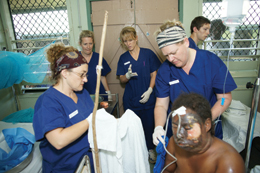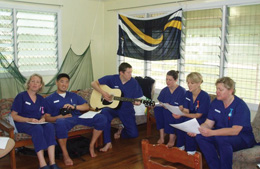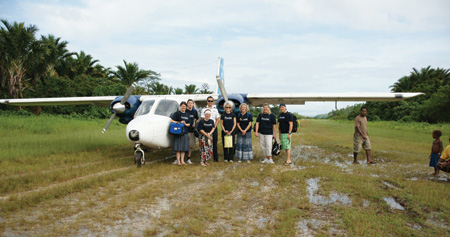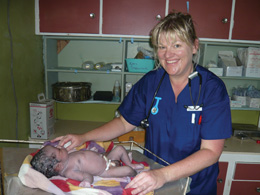In October 2010 a group of final-year nursing students from Avondale’s Sydney campus caught a fresh vision of humanitarian service during a two-week clinical placement at the Atoifi Adventist Hospital in the Solomon Islands. The group, led by nursing lecturer Sonja Frischknecht, included seven final-year nursing students and the husband of one of the students, himself a registered nurse.
The objectives of the trip were to apply students’ knowledge and clinical skills under very different conditions from their previous clinical education, to develop flexibility in adapting to a challenging clinical environment, to gain experience in cross-cultural relationships, and to catch an enlarged vision of human need and a passion for making a difference.

Treating burns patient: (L to R) Fiona Watkins, Michelle Chalker, Lynelle King, Sonja Frischknecht, Peter Demol.
Atoifi Hospital is situated on a remote inlet on the east coast of Malaita. There is currently no access by road; supplies are flown to a grass airstrip about 1.5 km from the hospital. Patients arrive by dugout canoe or by foot over the mountains. The region includes a people group (the Kwaio) who are still devil worshippers. In the past forty years two expatriate staff of the hospital have lost their lives to violence from this group of people, who resented the presence of Christianity in their area. In recent times several hospital staff have learned the Kwaio language and regularly walk up the mountain to conduct health clinics and evangelistic meetings among these people.
Atoifi is one of only five hospitals in the Solomons. Serving a population of 80,000, the hospital has ninety beds (fifty occupied during the students’ visit), a school of nursing, and an outpatient clinic; it also operates clinics in surrounding villages. It is staffed by a doctor, a pharmacist, a director of nursing and two registered nurses who are assisted on the wards by student nurses. The hospital’s school of nursing, with about forty students, offers a three-year diploma that provides half the nursing graduates in the Solomons. Atoifi graduates are highly regarded.
Four hours after leaving Sydney the Avondale students found themselves in an environment where life expectancy at birth is a little over 60 and childhood mortality is 66 in every 1000. Major health issues include malaria, tropical ulcers, burns, respiratory infections, common childhood diseases, and diarrhoeal diseases (the leading cause of death in children under five). Wounds are common in an area where even children carry machetes.
The Avondale group engaged in clinical work, patient care, nurse training, community health education, and health screening and vaccinations in local schools. Students were involved in cannulation, wound care, treatment of burns, lancing/draining of abscesses, injecting local anaesthetic, dispensing medicines, triage diagnosis of outpatients, and assisting with childbirth deliveries. The group had many opportunities to share their faith in Jesus.
The students learned to cope with very significant challenges in conditions radically different from what they were used to in Australia. Atoifi depends on donated medical supplies, and a serious shortage of basic resources impedes clinical practice. There was little diagnostic equipment, X-ray equipment was not functioning, the autoclave operated on only two days per week, and aseptic treatment and infection control are difficult. Power outages often make the wards very dark, and late at night babies are delivered by torchlight. Students and staff worked in 35-degree temperatures and near 100 per cent humidity. In this climate tape will not stick to sweaty skin, wounds do not heal easily, and infections spread rapidly.
Students had to use their ingenuity to devise alternative ways of doing things when methods they were used to were not available, and they learned to function more autonomously than they would expect to do in an Australian hospital. They were also thrust into roles they would not normally have encountered as nurses in Australia. They adapted to the challenges with flexibility and maturity, applying their classroom learning to the new conditions quickly and effectively.
Among the more serious cases treated by the group was an epileptic woman who had fallen face down into a fire, and who arrived at the hospital by canoe eight hours later with extensive burns to the face, respiratory tract and upper body. Amazingly, she lived. Another day a woman in labour was brought in by canoe and gave birth at the wharf before help could arrive from the hospital. The baby was suffering severe oxygen deprivation, so Sonja Frischknecht ran with the baby 500 metres up the hill to the hospital’s oxygen equipment while Avondale students assisted in delivering the placenta. The group saw miraculous recoveries of people who would not normally have survived; but they were also saddened by others who slipped away because necessary supplies or technology were unavailable.
During their stay in Atoifi the students’ experiences led to group discussions with their lecturer about life and death, disease and suffering, poverty and injustice, and the love and grace of God. Sonja Frischknecht reported that each of the students grew in their knowledge of God, their love for Jesus and their excitement for involvement in mission. ‘The satisfaction of making such a difference to people’s lives outweighed the difficulties and challenges, and the students’ passion for mission service grew noticeably as the time went on,’ she said. One of the satisfying things about the trip, she said, was ‘the encouragement it brought to the small group of faithful (and somewhat forgotten) staff at Atoifi who offer health care in the name of Jesus.’

Group worship: (L to R) Michelle Chalker, Loring Kwon, Peter Demol, Lauren Demol, Lynelle King, Sonja Frischknecht.
The students’ comments on returning to Sydney included the following: ‘We have all grown; it was a life-changing experience.’ ‘We learned to adapt to the situation and the need to provide the best care with what you have.’ ‘I learned how much strength I have and how much knowledge I possess that is not routinely used.’ ‘I learned to increase my faith.’ ‘I came back hungry for more mission work; I developed so much in my spirituality.’
Commenting on the students’ experience at Atoifi, Avondale’s President, Dr Ray Roennfeldt, said: ‘Living for oneself is not enough; living to be the hands of God in the world is so important. This is the kind of experience Avondale wants to foster.’
The trip has led to various media opportunities, including a half-hour interview on radio Rhema FM and an Adventist Media Network interview. In 2010 Sonja Frischknecht completed a Master of Nursing thesis analysing the project, its educational significance, and students’ responses to the experience. Examiners have recently assessed the thesis to be of first class honours standard.








